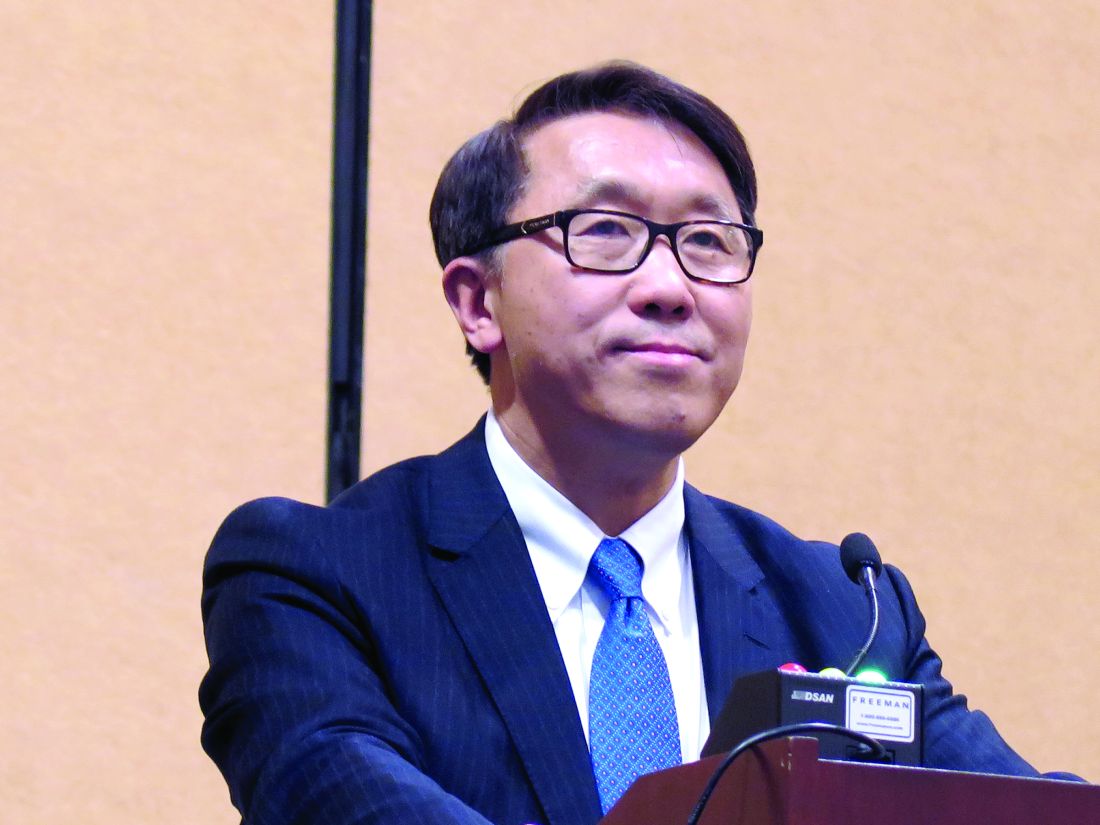User login
SAN FRANCISCO – The immune checkpoint inhibitor pembrolizumab is active and well tolerated when used as second-line therapy for hepatocellular carcinoma, according to results of the KEYNOTE-224 trial.
The 104 patients treated on the single-arm, open-label phase 2 trial had advanced hepatocellular carcinoma (HCC) previously treated with sorafenib (Nexavar), the standard of care for first-line therapy. All received monotherapy with pembrolizumab (Keytruda), an anti–programmed death 1 antibody.
A quarter of patients experienced grade 3 or worse treatment–related adverse events, but only about 7% stopped treatment because of such events.
“Pembrolizumab treatment demonstrated efficacy in advanced HCC previously treated with sorafenib as evidenced by durable responses and promising progression-free and overall survival,” said Andrew X. Zhu, MD, PhD, director of liver cancer research at Massachusetts General Hospital, Boston, and a professor of medicine at Harvard Medical School, Boston. “The safety profile was generally comparable to what has been established for pembrolizumab monotherapy in other indications, and no viral flares were seen in this cohort.”
The investigators are analyzing data for biomarkers such as programmed death ligand 1, alpha-fetoprotein, and microsatellite instability, to identify predictors of benefit, he added. In addition, a phase 3 randomized trial evaluating pembrolizumab versus placebo as second-line therapy in this population (KEYNOTE-240) is under way.
Session cochair Shishir K. Maithel, MD, of Emory University, Atlanta wondered whether the findings are robust enough to justify use of immune checkpoint inhibitors earlier in the course of HCC today.
“Do we have to wait for the trials that look at immunotherapy in the first-line setting before we start using immunotherapy in the first-line setting?” he asked. “I’ve spoken with many people, and it seems like, based on these data in the second line, people have actually moved immunotherapy to the first line, given the relatively modest responses to sorafenib.”
“It’s fair to say the ongoing first-line trial is needed to definitively demonstrate whether there is an overall survival benefit,” Dr. Zhu replied. “As of now, nivolumab [Opdivo] is approved in the second-line setting. If you are really evidence based, we still have to follow the guideline. But having said that, in selected settings, it’s up to the treating physician’s consideration and mutual agreement and discussion with the patient. I think decisions will be made regardless of what you say or I say.”
Patients treated in the KEYNOTE-224 trial, sponsored by Merck, had stopped sorafenib because of progression (80%) or intolerance (20%). Some 21.2% were hepatitis B virus–positive and 26% were hepatitis C virus–positive.
Additional findings showed that median time to response with pembrolizumab was 2.1 months, corresponding to the timing of the first planned response assessment, Dr. Zhu said at the symposium, which was sponsored by the American Gastroenterological Association, the American Society for Clinical Oncology, the American Society for Radiation Oncology, and the Society of Surgical Oncology.
The disease control rate was 61.5%. Waterfall plots showed a similar pattern of responses regardless of whether patients had hepatitis B virus infection, hepatitis C virus infection, or no hepatitis virus infection.
The rate of grade 3 or worse adverse events was 25%; the rate of events leading to discontinuation was just 6.7%, and the rate of events leading to death was 1.0%, reported Dr. Zhu. The most common events of any grade were pruritus (21.2%) and fatigue (12.5%).
In terms of hepatic-related events, 2.9% of patients developed immune-mediated hepatitis on pembrolizumab, but none experienced a viral flare.
Dr. Zhu disclosed that he has a consulting or advisory role with Merck. The trial was sponsored by Merck.
SOURCE: Zhu AX et al. GI Cancers Symposium Abstract 209
SAN FRANCISCO – The immune checkpoint inhibitor pembrolizumab is active and well tolerated when used as second-line therapy for hepatocellular carcinoma, according to results of the KEYNOTE-224 trial.
The 104 patients treated on the single-arm, open-label phase 2 trial had advanced hepatocellular carcinoma (HCC) previously treated with sorafenib (Nexavar), the standard of care for first-line therapy. All received monotherapy with pembrolizumab (Keytruda), an anti–programmed death 1 antibody.
A quarter of patients experienced grade 3 or worse treatment–related adverse events, but only about 7% stopped treatment because of such events.
“Pembrolizumab treatment demonstrated efficacy in advanced HCC previously treated with sorafenib as evidenced by durable responses and promising progression-free and overall survival,” said Andrew X. Zhu, MD, PhD, director of liver cancer research at Massachusetts General Hospital, Boston, and a professor of medicine at Harvard Medical School, Boston. “The safety profile was generally comparable to what has been established for pembrolizumab monotherapy in other indications, and no viral flares were seen in this cohort.”
The investigators are analyzing data for biomarkers such as programmed death ligand 1, alpha-fetoprotein, and microsatellite instability, to identify predictors of benefit, he added. In addition, a phase 3 randomized trial evaluating pembrolizumab versus placebo as second-line therapy in this population (KEYNOTE-240) is under way.
Session cochair Shishir K. Maithel, MD, of Emory University, Atlanta wondered whether the findings are robust enough to justify use of immune checkpoint inhibitors earlier in the course of HCC today.
“Do we have to wait for the trials that look at immunotherapy in the first-line setting before we start using immunotherapy in the first-line setting?” he asked. “I’ve spoken with many people, and it seems like, based on these data in the second line, people have actually moved immunotherapy to the first line, given the relatively modest responses to sorafenib.”
“It’s fair to say the ongoing first-line trial is needed to definitively demonstrate whether there is an overall survival benefit,” Dr. Zhu replied. “As of now, nivolumab [Opdivo] is approved in the second-line setting. If you are really evidence based, we still have to follow the guideline. But having said that, in selected settings, it’s up to the treating physician’s consideration and mutual agreement and discussion with the patient. I think decisions will be made regardless of what you say or I say.”
Patients treated in the KEYNOTE-224 trial, sponsored by Merck, had stopped sorafenib because of progression (80%) or intolerance (20%). Some 21.2% were hepatitis B virus–positive and 26% were hepatitis C virus–positive.
Additional findings showed that median time to response with pembrolizumab was 2.1 months, corresponding to the timing of the first planned response assessment, Dr. Zhu said at the symposium, which was sponsored by the American Gastroenterological Association, the American Society for Clinical Oncology, the American Society for Radiation Oncology, and the Society of Surgical Oncology.
The disease control rate was 61.5%. Waterfall plots showed a similar pattern of responses regardless of whether patients had hepatitis B virus infection, hepatitis C virus infection, or no hepatitis virus infection.
The rate of grade 3 or worse adverse events was 25%; the rate of events leading to discontinuation was just 6.7%, and the rate of events leading to death was 1.0%, reported Dr. Zhu. The most common events of any grade were pruritus (21.2%) and fatigue (12.5%).
In terms of hepatic-related events, 2.9% of patients developed immune-mediated hepatitis on pembrolizumab, but none experienced a viral flare.
Dr. Zhu disclosed that he has a consulting or advisory role with Merck. The trial was sponsored by Merck.
SOURCE: Zhu AX et al. GI Cancers Symposium Abstract 209
SAN FRANCISCO – The immune checkpoint inhibitor pembrolizumab is active and well tolerated when used as second-line therapy for hepatocellular carcinoma, according to results of the KEYNOTE-224 trial.
The 104 patients treated on the single-arm, open-label phase 2 trial had advanced hepatocellular carcinoma (HCC) previously treated with sorafenib (Nexavar), the standard of care for first-line therapy. All received monotherapy with pembrolizumab (Keytruda), an anti–programmed death 1 antibody.
A quarter of patients experienced grade 3 or worse treatment–related adverse events, but only about 7% stopped treatment because of such events.
“Pembrolizumab treatment demonstrated efficacy in advanced HCC previously treated with sorafenib as evidenced by durable responses and promising progression-free and overall survival,” said Andrew X. Zhu, MD, PhD, director of liver cancer research at Massachusetts General Hospital, Boston, and a professor of medicine at Harvard Medical School, Boston. “The safety profile was generally comparable to what has been established for pembrolizumab monotherapy in other indications, and no viral flares were seen in this cohort.”
The investigators are analyzing data for biomarkers such as programmed death ligand 1, alpha-fetoprotein, and microsatellite instability, to identify predictors of benefit, he added. In addition, a phase 3 randomized trial evaluating pembrolizumab versus placebo as second-line therapy in this population (KEYNOTE-240) is under way.
Session cochair Shishir K. Maithel, MD, of Emory University, Atlanta wondered whether the findings are robust enough to justify use of immune checkpoint inhibitors earlier in the course of HCC today.
“Do we have to wait for the trials that look at immunotherapy in the first-line setting before we start using immunotherapy in the first-line setting?” he asked. “I’ve spoken with many people, and it seems like, based on these data in the second line, people have actually moved immunotherapy to the first line, given the relatively modest responses to sorafenib.”
“It’s fair to say the ongoing first-line trial is needed to definitively demonstrate whether there is an overall survival benefit,” Dr. Zhu replied. “As of now, nivolumab [Opdivo] is approved in the second-line setting. If you are really evidence based, we still have to follow the guideline. But having said that, in selected settings, it’s up to the treating physician’s consideration and mutual agreement and discussion with the patient. I think decisions will be made regardless of what you say or I say.”
Patients treated in the KEYNOTE-224 trial, sponsored by Merck, had stopped sorafenib because of progression (80%) or intolerance (20%). Some 21.2% were hepatitis B virus–positive and 26% were hepatitis C virus–positive.
Additional findings showed that median time to response with pembrolizumab was 2.1 months, corresponding to the timing of the first planned response assessment, Dr. Zhu said at the symposium, which was sponsored by the American Gastroenterological Association, the American Society for Clinical Oncology, the American Society for Radiation Oncology, and the Society of Surgical Oncology.
The disease control rate was 61.5%. Waterfall plots showed a similar pattern of responses regardless of whether patients had hepatitis B virus infection, hepatitis C virus infection, or no hepatitis virus infection.
The rate of grade 3 or worse adverse events was 25%; the rate of events leading to discontinuation was just 6.7%, and the rate of events leading to death was 1.0%, reported Dr. Zhu. The most common events of any grade were pruritus (21.2%) and fatigue (12.5%).
In terms of hepatic-related events, 2.9% of patients developed immune-mediated hepatitis on pembrolizumab, but none experienced a viral flare.
Dr. Zhu disclosed that he has a consulting or advisory role with Merck. The trial was sponsored by Merck.
SOURCE: Zhu AX et al. GI Cancers Symposium Abstract 209
REPORTING FROM THE 2018 GI CANCERS SYMPOSIUM
Key clinical point:
Major finding: The overall response rate with pembrolizumab was 16.3%, and median duration of response was 8.2 months.
Data source: A single-arm phase 2 trial among 104 patients with advanced HCC previously treated with sorafenib (KEYNOTE-224).
Disclosures: Dr. Zhu disclosed that he has a consulting or advisory role with Merck. The trial was sponsored by Merck.
Source: Zhu AX et al. GI Cancers Symposium, Abstract 209

